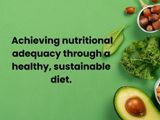March 28th 2024
A healthier and more sustainable diet involves a nuanced understanding of the interaction of several factors including protecting individual and planetary health, providing adequate nutrition, and ensuring diets are accessible, affordable and culturally appropriate to everyone. The Food and Agriculture Organization (FAO) have emphasised that healthy diets are the cornerstone of good nutrition, and agrifood systems have a vital role to play in enabling healthy diets for all. However, many agrifood systems are not working optimally, and face significant stresses.
To meet the UK’s greenhouse gas (GHG) emissions targets, the Climate Change Committee (CCC) recommend reducing current meat and dairy intake by 20% by 2030. This requires a food systems transformation and a dietary shift towards plant-forward diets, however the short- and long-term impact of this shift on nutrient intakes is unclear.
This British Nutrition Foundation webinar aimed to discuss how the reduction in consuming meat and dairy might affect our nutrient intakes, especially in vulnerable groups, and how these foods may be included in a way that can best support sustainability and public health goals.

Who presented?

Achieving nutritional adequacy in a healthy, sustainable diet – a public health perspective
Dr Pippa Gibson
Senior Nutrition Scientist, British Nutrition Foundation

How can the benefits and risks of animal source food production be balanced for human and planetary health?
Prof Michael Lee
Deputy Vice-Chancellor, Harper Adams University

Potential risks of environmentally protective diets on micronutrients in vulnerable groups
Prof Mairead Kiely
Professor in Human Nutrition, University College Cork

A case study: Modelling the impact of reducing meat and dairy intakes on the population living in Scotland
Dr Fiona Comrie
Senior Public Health Nutrition Adviser, Food Standards Scotland
Audience:
This webinar will be of interest if you want to explore more about healthy and sustainable diets and will benefit anyone working in the below areas:
- public health
- nutrition and dietetics
- sustainable diets
- the food industry
It is also suitable for those teaching, studying, researching or just with a keen interest in these areas.
The British Nutrition Foundation is grateful to Agriculture and Horticulture Development Board (AHDB) for providing an educational grant towards the success of this webinar. The programme has been directed by the Foundation alone, which is committed to producing independent, evidence based science.
